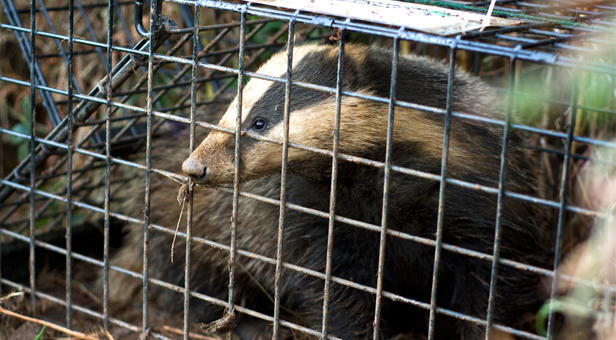
A badger ready to be released after vaccination. All traps were clearly labelled so members of the public could contact DWT for more information. By Sam Stewart.
A five-year programme of badger vaccinations has started on selected Dorset Wildlife Trust (DWT) nature reserves to demonstrate that there is a safe, humane alternative to badger culling.
DWT wants to see the eradication of the devastating disease Bovine Tuberculosis (bTB) and understands the serious implications for farmers who lose stock as a result, but believes there are more effective and reliable ways of controlling the disease, such as better biosecurity, badger vaccination and, in the long term, cattle vaccination. Badger vaccination has the potential to reduce bTB without the negative impacts of increasing the transference of bTB amongst infected and healthy badgers and cattle that culling would bring.
Chief Executive of Dorset Wildlife Trust, Dr Simon Cripps said, “We were extremely disappointed to see the government drive forward with the badger cull in Somerset and Gloucestershire in August this year. The recent news that the pilot culls in Gloucestershire and Somerset have finished with low numbers of badgers being shot, strengthens the need for the government to support alternative methods to culling. Our understanding from Defra is that if badger culling continues despite these failures, shooting in Dorset is highly likely to start in 2014. Thanks to our successful badger vaccination appeal, Dorset Wildlife Trust is pleased to be able to start a vaccination programme on selected nature reserves in Dorset, to both protect badgers and support farmers.”
A small team of volunteers and DWT staff have completed a badger vaccination course run by the Animal Health and Veterinary Laboratories Agency (AHVLA) and have been issued with certificates of competence as lay vaccinators. In order to carry out the vaccinations, DWT obtained a license from Natural England and carried out detailed site surveys to identify the best location for humane traps, which were baited with peanuts and clearly labelled when out on-site. The badgers were vaccinated and released unharmed as quickly as possible.






